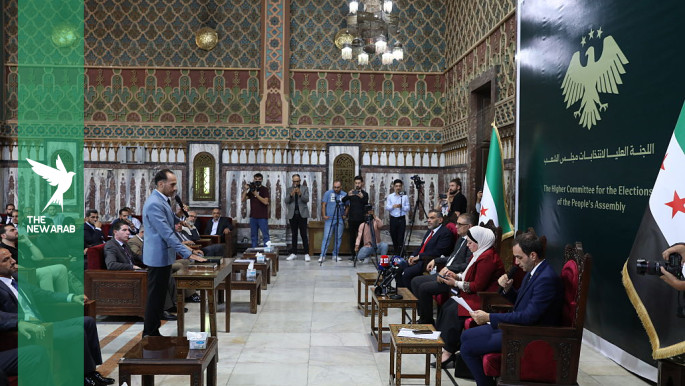Members of the Syria’s new electoral subcommittees are sworn in at a ceremony in Damascus on 3 September 2025 [Getty]
Syria’s first elections since the overthrow of the Assad regime began on Monday in a vote that will form the first parliament since Islamist rebels ended decades of Baathist rule in December.
Voting for the 210-member People’s Assembly will continue through to Saturday, with MPs selected by local electoral colleges rather than individual voters under a new system introduced by President Ahmed al-Sharaa’s government.
The committees will elect two-thirds of the assembly, while Al-Sharaa will handpick the remaining 70 representatives.
Voting could be extended past Saturday if necessary, the head of the government’s election committee said over the weekend.
Seats are being allocated based on the population size of each governorate.
Voting will not take place in the Druze-majority province of Suweida and the Kurdish-controlled governorates of Raqqa and Hasakah amid a continued stand-off with the government.
Damascus has struggled to reintegrate the regions amid concerns among minorities about the influence of Islamists on the government.
Attitudes among the Druze and the Kurds have hardened in recent months in the wake of sectarian violence carried out by pro-government forces in Syria’s coastal region and Suweida province.
The postponement of voting in the autonomous regions will leave 19 seats vacant in the assembly.
The use of committees to elect MPs has prompted concerns from some quarters about how members were selected and whether the parliament will be inclusive.
Officials have defended the use of committees, citing the fragile security situation, demographic challenges, and administrative obstacles faced by the new government.
Holding a popular vote is not possible while millions of Syrians remain internally displaced and the government remains in a transitional state, they say.
In March, Al-Sharaa signed into law an interim constitution that set out a five-year transition period that would lead to fresh presidential elections.
The constitution handed the president far-reaching powers over passing legislation, appointing MPs to the assembly, and making judicial appointments.
